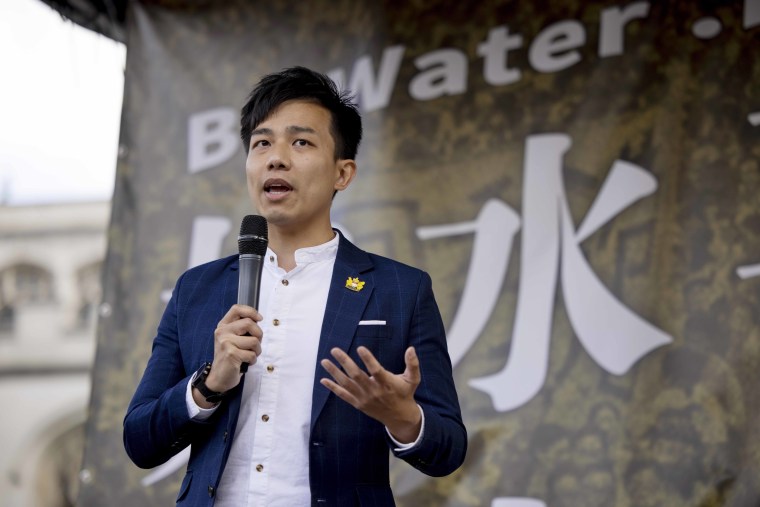LONDON — He woke up to find he had a million-dollar bounty on his head.
But Finn Lau, a pro-democracy activist from Hong Kong, said he wasn’t shocked to see the lucrative reward next to his mugshot on the arrest warrant issued earlier this week by national security police in the Chinese territory.
“This sort of bounty or safety risks will not deter me from continuing advocating for Hong Kong human rights and democracy,” he told NBC News by telephone Tuesday from his apartment in London.
Hong Kong authorities are offering 1 million Hong Kong dollars ($128,000) each for information leading to the arrest of Lau and seven other activists living in self-exile in the United States, Britain and Australia. They are the first such cash rewards since Beijing imposed a national security law on the city in June 2020, which the activists are accused of breaching.
The announcement comes as the international financial hub is trying to repair its image damaged by years of Covid restrictions, as well as the national security law, which the U.S. and others say is being used to erode freedoms that were promised to Hong Kong, a former British colony, upon its return to Chinese sovereignty in 1997.
Chinese and Hong Kong authorities say the law was necessary to restore stability after anti-government protests that roiled the city for months in 2019, sometimes turning violent.

The U.S., Britain and Australia, all of which suspended their extradition treaties with Hong Kong after the national security law was imposed, condemned the bounties, describing them as an attempt by China to intimidate and silence overseas critics.
The extraterritorial application of the national security law “is a dangerous precedent that threatens the human rights and fundamental freedoms of people all over the world,” the State Department said in a statement.
Chinese and Hong Kong authorities accuse the three countries of harboring “fugitives,” and say the U.S., Britain and Australia have also sought to apply their national security laws outside their own territories.
Their charges against the eight activists include urging foreign governments to impose sanctions on Hong Kong and advocating Hong Kong’s independence from China.
Since moving abroad, the activists have “continued to instigate the division of the country and subversion of state power, acting as pawns for external anti-China forces in their effort to interfere in Hong Kong affairs,” Chinese Foreign Ministry spokesperson Mao Ning said at a regular briefing in Beijing on Tuesday.
Chief Executive John Lee, Hong Kong’s top leader, has said the eight activists will be “pursued for life,” urging them to surrender. He encouraged “anyone,” including friends and relatives, to aid in their apprehension.
Speaking out from afar
Since leaving Hong Kong for the British capital in January 2020, Lau has continued to speak out about issues affecting his former home.
Chief among his concerns is the national security law, which criminalizes secession, subversion, terrorism and collusion with foreign forces. The law carries penalties up to life in prison and asserts jurisdiction over everyone in the world, regardless of nationality or location.
More than 250 people in Hong Kong have been arrested under the legislation, including 47 pro-democracy politicians and activists who have mostly been held without bail for more than two years.






